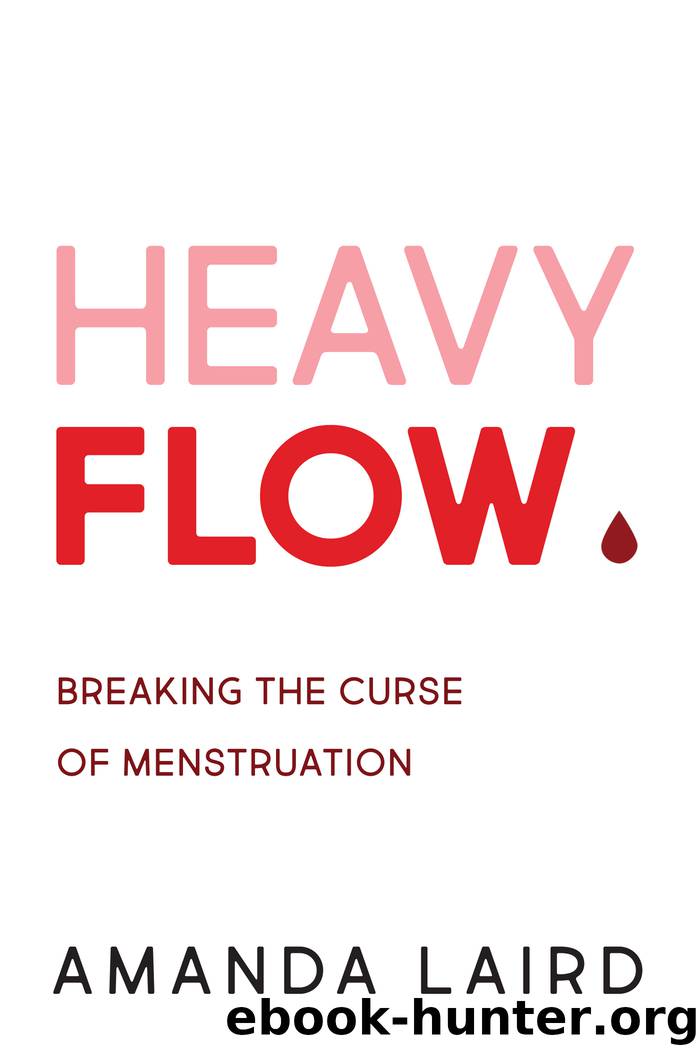Heavy Flow by Amanda Laird

Author:Amanda Laird [Laird, Amanda]
Language: eng
Format: epub
Publisher: Dundurn
Published: 2019-02-23T00:00:00+00:00
CHAPTER 7
THE NUTRITION APPROACH TO PERIOD CARE
Despite everything that we know about medicine, many still believe that there is nothing we can do about our bad periods: that our fate, by being born into a female body, is pain and inconvenience.
Throughout my teen years, while I was sewing my own pads and making zines about toxic tampons, I was still experiencing menstrual cramps and heavy bleeding. In my twenties, as I bounced from one brand of hormonal contraception to another, it was migraines that kept me home from work — but more often than not I powered through it; on more than one occasion I lay down right on my office floor to try and breathe through the pain.
Nutrition school was the first place where it was ever presented to me that my period didn’t have to be a curse. My ears perked up — for one, despite being on hormonal contraceptives, I still experienced symptoms before my bleed that were unpleasant, to say the least. And, even more importantly, the one thing that kept me on hormonal birth control, despite feeling that it no longer fit with my wish to live a more organic, natural life, was the terror that the heavy, erratic periods that I had known in my teen years and any time I had gone off the pill in the past would return — perhaps with a vengeance.
I was right to be concerned. Because hormonal contraception doesn’t regulate your period at all, but instead replaces your natural hormones with synthetic ones, symptoms aren’t relieved but simply masked. When you begin taking hormonal contraception before your cycle matures around age twenty, your cycle doesn’t have a chance to sort itself out. So, it’s going to have to do that later in life when you come off of hormonal contraception.
Even if you haven’t recently transitioned off hormonal birth control, or have never taken it at all, easier, more manageable periods are possible.
Our hormones are very sensitive to stress and nutrition, which means that a high-stress lifestyle and poor diet are going to adversely effect our hormonal health and, ultimately, our periods. Stress suppresses ovulation, and we need to ovulate in order to get the benefits of progesterone. If we’re not making enough progesterone, estrogen can skyrocket without the counterbalance of progesterone, which contributes to period problems. And in a bizarre twist, higher levels of estrogen lead to higher levels of cortisol, a hormone that regulates our stress response — which in turn is going to affect our ability to ovulate.
And so, the cycle goes on and on.
The good news, however, is that food and lifestyle changes to reduce or manage stress can have a positive effect on our hormonal health and menstrual experience.
Looking at the evidence, there’s an overwhelming case that the food we eat — or don’t eat — has a profound effect on our hormones and therefore our menstrual health. PMS is linked to several deficiencies of vitamins and minerals, food allergies, and the body’s ability to metabolize carbohydrates and essential fatty acids.
Download
This site does not store any files on its server. We only index and link to content provided by other sites. Please contact the content providers to delete copyright contents if any and email us, we'll remove relevant links or contents immediately.
The Rules Do Not Apply by Ariel Levy(4965)
On the Front Line with the Women Who Fight Back by Stacey Dooley(4872)
The Lonely City by Olivia Laing(4801)
Bluets by Maggie Nelson(4553)
The Confidence Code by Katty Kay(4259)
Three Women by Lisa Taddeo(3433)
Not a Diet Book by James Smith(3422)
Inferior by Angela Saini(3312)
Confessions of a Video Vixen by Karrine Steffans(3308)
A Woman Makes a Plan by Maye Musk(3253)
Pledged by Alexandra Robbins(3176)
Wild Words from Wild Women by Stephens Autumn(3153)
Nice Girls Don't Get the Corner Office by Lois P. Frankel(3044)
Brave by Rose McGowan(2821)
Women & Power by Mary Beard(2767)
Why I Am Not a Feminist by Jessa Crispin(2759)
The Girl in the Spider's Web: A Lisbeth Salander novel, continuing Stieg Larsson's Millennium Series by Lagercrantz David(2721)
The Clitoral Truth: The Secret World at Your Fingertips by Rebecca Chalker(2720)
I Who Have Never Known Men by Jacqueline Harpman(2668)
